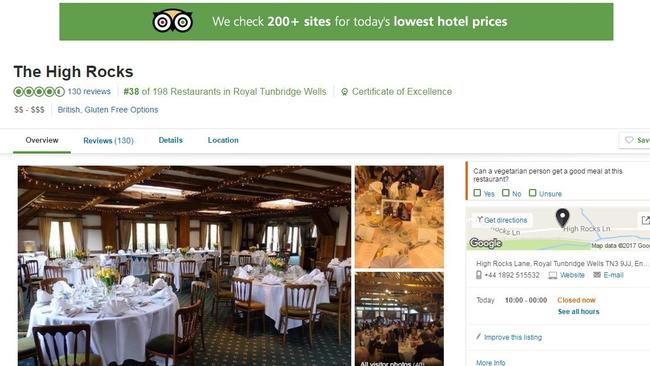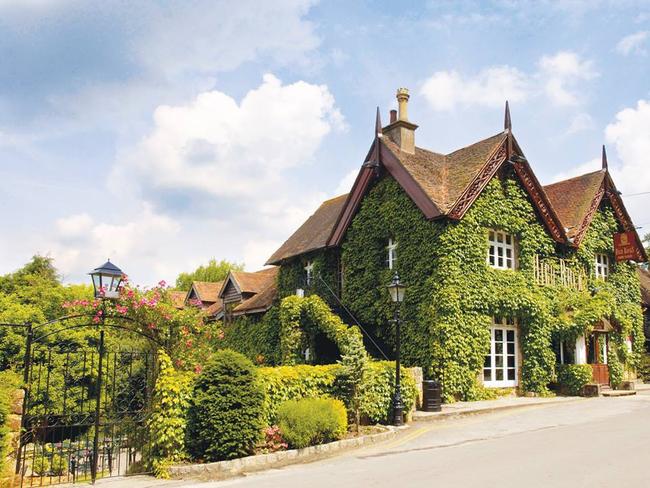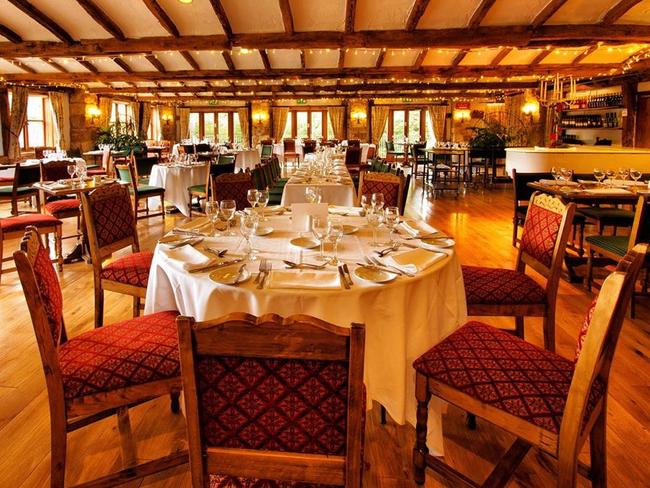Woman threatened with legal action over one-star TripAdvisor review
A RESTAURANT that threatened to sue a customer over a one-star on TripAdvisor has experienced a huge backlash online.

A RESTAURANT that threatened to sue a customer over a one-star on TripAdvisor has experienced a huge backlash online.
Part-time nurse Sarah Gardner went public with the restaurant’s threats after receiving a letter from London law firm Cohen Davis Solicitors for a review she posted about the venue High Rocks in Kent, UK.
According to The Mirror, she claimed the staff had been rude when she tried to make a booking and that the food was “mediocre at best”.
Most restaurants have to deal with bad online reviews nowadays but High Rocks evidently decided not to take the negative feedback on the chin.
Ms Gardner said she was shocked to receive the legal demand marked “strictly not for publication” claiming her review was defamatory and had caused the business financial harm.
“Our client will pursue you for aggravated damages to compensate it for the full extent of its financial losses,” the letter said.
It also asked for details of when Ms Gardner visited the restaurant as well as details of fellow guests and meal receipts as well as a mock-up draft court injunction that began: “PENAL NOTICE: If you, Sarah Gardner, do not comply with this order you may be held in contempt of court and may be imprisoned or fined”.

Ms Gardner said she found the letter “very threatening” but was standing by her opinion even though she could not afford a solicitor.
Giuseppe Cappellazzi is the manager of the popular wedding spot and told The Times Ms Gardner had not visited the restaurant in the month the review was posted.
He denied the legal demand was “vindictive”. A statement issued by his lawyer reportedly said: “Ms Gardner’s false reviews came about because she was banned from booking our client’s establishment, having been extremely rude and offensive to staff over the phone”.
Ms Gardner has said she was writing about her general experience rather than a specific visit. On TripAdvisor she has left 50 reviews with an average rating of 3.4 stars.
It’s not the first time the restaurant has taken an aggressive approach to negative criticism.
According to the Daily Mail , Mr Cappellazzi checked CCTV footage to find out whether one customer had enjoyed her meal after she described the venue’s spaghetti bolognese as “slop” on Facebook.
“We have studied the CCTV footage of the day and can say that your Spaghetti was served only ten minutes after you ordered it (the time it takes to cook),” Mr Cappellazzi wrote on Facebook in response.
“You appear to tuck into it and appear happy and smiling when you go to the bar to pay.
“Your response to our reply is malicious and misleading.”

He also accused the woman of deliberately misrepresenting the issue by only referring to a few negative Google reviews.
“High Rocks has far more good reviews than bad reviews and you omit to mention the twenty one 5 star Google reviews, nor do you mention the 92 Five Star Facebook reviews, which is strange considering you posted your review on Facebook.
“Your posting is therefore malicious. In fact not all of the reviews you have shown are completely truthful and one of them is an outright lie for which we have instructed solicitors.”
But it looks like Mr Cappellazzi may no longer be able to rely on his positive reviews with people flooding the venue’s Facebook page with one star reviews.
High Rocks now has 114 five-star reviews compared to 102 one-star reviews on Facebook.
Many of the negative reviews are bizarre and deliberately offensive but others refer directly to the restaurant’s legal action. One man says: “What an absolute disgrace the owner of this business is and his solicitors trying to basically bully a nurse.”
Another states: “The damage done the brand by his own actions far exceed anything a bad review would do”.
Professor Andrew Kenyon of Melbourne Law School told news.com.au Australians could also be sued for defamation over online comments and it was likely easier to do here than in the UK.
“The potential is certainly there (to get sued),” he said. “The general test for defamation is not that hard to meet”.
He said the UK had introduced a law few years ago that meant claimants had to show “serious harm” but this didn’t exist in Australia. This was particularly relevant in the online space as people could argue one negative review may not be seen or cause that much harm if there were hundreds of positive reviews.
But he said Australians could rely on a defence for “honest opinion” or “honest comment”.
“Basically if you give an honest opinion you should be fine,” he said.
The only difficulty is if you are sued, you would have to prove the comment was true. The money and stress of defending claims in court could deter many from doing this.
However, Prof Kenyon said the backlash against High Rocks showed suing customers for negative reviews could be counter-productive.



